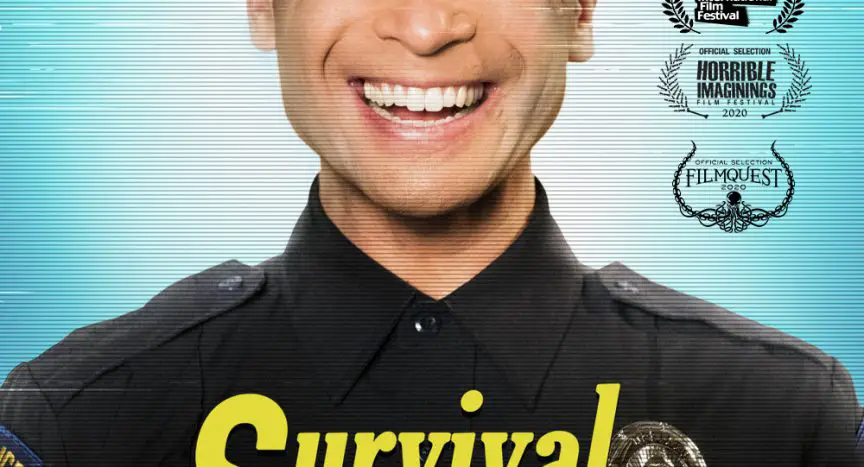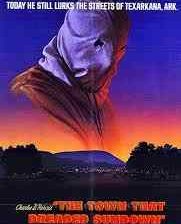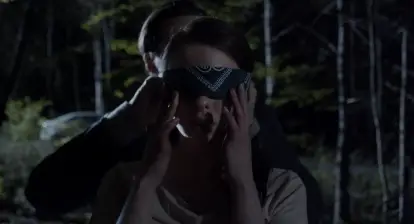Survival Skills opens with a nostalgic analog aesthetic, which will be familiar to those who’ve watched 2019’s VHYes, the television work of comedians Tim & Eric, or any number of Adult Swim branded short films. Writer and director Quinn Armstrong has taken a painstaking attention to visual detail, complete with bursts of static, odd color balances and tracking errors.
Presented as a lost 1988 police training video, an omniscient narrator (a perfectly cast Stacy Keach) walks the audience through a rookie police officer’s first year on the job, learning acronym friendly lessons in established procedure in each step along the way. Our avatar on this journey is Jim Williams (Vayu O’Donnell). The narrator assembles him right before our eyes as the perfect combination of compassion and compliance. Jim’s entire identity is constructed to uphold law and order in the whitebread, middle class suburb of Middletown, USA.
Jim has a home full of all the creature comforts one could want (conveniently marked with price tags), and a day dress wearing dream of a girlfriend, Jenny (Tyra Colar). Idealistic, impressionable, and impossibly cheerful Jim is somewhere between the perfect employee and the hapless innocent flailing about in overheated infomercial cautionary tales. Jim is always ready with a thumbs up or a high five (to the annoyance of his more self aware virtual coworkers), or to put his own personal resources to use to help the community. Accordingly, he breezes through the first few days of the simulation.
Also See: Five VHS Only Horror Movies that Need a DVD Release
However, when the narrator’s spin of a roulette wheel of possible assignments lands on a domestic violence case, Jim can’t quite accept the limitations of the rulebook in helping an abused wife and child. Like a VHS era velveteen rabbit, his dogged empathy allows him to becomes something much closer to human, or at least close enough that he can exercise free will. Having lost control, the narrator frantically rewinds the tape in the hopes of getting Jim back on script.
Survival Skills‘ first act plays out as a coal black comedy, sending up the familiar excesses and failings of the Reagan era, as well as the instructional videos that provide the inspiration for the meta narrative. While the content of the jokes is familiar, the training tape device is an effectively fresh framework in which to present commentary on rampant consumerism and the naked paranoia that marked the authorities of the time, from Satanic Panic to a police training exercise in self defense that ends up little more than a violent fantasy of an aerobics class.
Also See: Maniac Cop Still Holds Up Impossibly Well: Here’s Why!
However, there is an abrupt tonal shift in the back half of the film, as the newly self aware Jim tries and fails to help the abuse victims, and must face the fact that being deadly earnest doesn’t mean much in the face of a system that places greater value on punitive actions for perpetrators than it does on restorative justice for victims. From overcrowded shelters and job scarcity to a church congregation more interested in the afternoon’s football, Jim’s road to hell is classically paved with ineffective good intentions, and he slowly becomes unhinged.
As Survival Skills moves away from comedy to bleaker material, the framing device becomes more and more of an albatross, as time is spent on comedic asides and meta visuals that would be better served focusing on Vayu O’Donnell’s incredible performance, a layered, nuanced descent into what isn’t madness as much as defeat. A face once beaming the bright light of possibility replaced by robotic repetition and psychological deterioration. Rather than the time jump that opens the final act (which is also where the film switches to a more traditional cinematic style), it would have been more effective to linger on a man becoming as broken as the system he serves.
Also See: 10 Terrifying Modern Day Torture Methods
Survival Skills isn’t as scathing of an indictment of American policing as it could be, as its focus is often too broad to linger on the larger questions it raises. Is the reactive, violent paranoia built into police training the root problem? Or is that merely a reflection of a society indifferent to the long tail causes of crime, abuse and poverty that can’t be neatly categorized into a simple binary of “us versus them”? Why is mere carceral focused punishment so often equated to a more broad ranging justice?
In equal turns darkly comic and just plain dark, an incredible central performance and a unique narrative perspective make Survival Skills engaging despite it somewhat muddied and tentative messaging. The film’s strongest scenes lie in its realistic treatment of domestic violence and its aftermath. With ever shrinking social safety nets and a woefully underfunded shelter system, many victims have no resources and lack a safe place to go during a drawn out wait for a trial. Due to a complete lack of other options, they often end up back in the hands of their abusers, and the cycle begins anew.
Jim may have gone off script, but still ends up as another sort of avatar. Rather than a smiling piece of copraganda, his descent into obsession and dead eyed defeat becomes a stand in for the many situations for which current law enforcement is woefully unprepared. Jim’s story ends horribly, but the real tragedy is all of his real life, modern day counterparts shuffling paperwork and going through the motions of a corrupt and dysfunctional system that is built more towards dehumanization of entire communities and state sanctioned violence than it is any notion of empathy, protection or service.
WICKED RATING: 7/10






